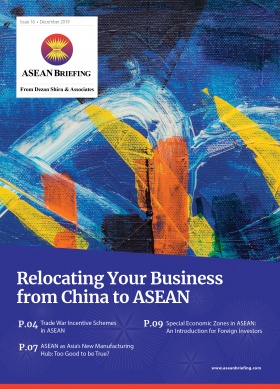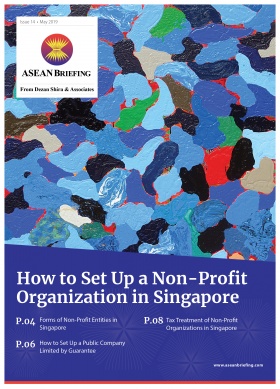Singapore Issues Guidelines on the Resumption of Business
- Singapore began to ease more of its lockdown measures on June 2, 2020, through the first of three phases of opening up the country.
- Under the first phase, a selected number of businesses and services can resume, although they have to adhere to strict healthcare measures.
- If local transmission of the virus remains low and stable under Phase 1, the country aims to proceed to Phase 2 by the end of June.
The Singaporean government has issued health guidelines for businesses as more of the lockdown measures were eased on June 2, 2020.
The reopening of the country and subsequently the economy will be done in three phases (Phase 1, 2, and 3). From June 2, the government gradually allowed the resumption of certain business activities that do not pose a high-risk of transmission. Businesses that have been permitted to open must adhere to strict health management measures, such as the mandatory wearing of masks and the staggering of work and break hours to prevent congestion at common spaces.
Trade Minister Chan Chun Sing hopes to have 80 percent of the economy running by Phase 1, and the government will monitor the effects of the increased activity and its impact on infection rates in the subsequent weeks. This is in spite of the country having the highest total number of COVID-19 cases, although these are isolated to clusters at migrant worker dormitories, which makes up some 90 percent of total cases in the country.Phase 1: Safe re-opening
Phase 1 covers four key areas, safe work, safe home, safe school, and safe care.
Safe work
From June 2, 2020, selected businesses considered to impose lower transmission risks were allowed to resume operations as well as restricted social activities.
Some services that have been authorized to resume include motor vehicle servicing, basic pet services, and barbers. Manufacturing and production facilities that can open include consumer electronics manufacturing, semiconductors production, and land transport engineering, among others. A full list of businesses that can operate can be found here.
Most offices can re-open, although dining in at F&B outlets is still disallowed during this phase but all home-based businesses that utilize a delivery/collection model will be allowed to operate.
Businesses that can operate during Phase 1 will get a class exemption from the government, meaning that although they do not need permission to open, they will need to submit information on the workers required on-site via the GoBusiness portal within two weeks of operating. During Phase 1, the government expects up to one third of all Singaporean workers to resume work on site.
Additionally, employees should install the SafeEntry app, the digital national check-in system that registers the ID cards of citizens and residents as well as the mobile numbers of individuals visiting hotspots, workplaces, and public venues to control the transmission of the virus through contact tracing and identifying new virus clusters.
Individuals going through any entry and exit points will have to check-in and out using the app. This can be done by scanning the QR code through the app or scanning the barcode on their ID cards, driver licenses, and Merdeka Generation card, among others.
Implementing safety measures
Prior to opening, businesses are required to implement strict health and safety measures to minimize any possible transmissions of the virus. The key safety measures are:
- Appointing a Safe Management Officer to implement the health and safety protocols;
- Employers should facilitate work-from-home practices to the maximum, ensuring that employees return to the workplace where it is demonstrable necessary;
- Employers must ensure the regular cleaning of common spaces such as pantries, canteens, and meeting rooms;
- Employers must make sure all on-site personnel wear masks as well as visitors, suppliers, and contractors;
- Employees should practise social distancing, wear masks, and maintain good personal hygiene;
- Businesses that do not comply with these health and safety requirements can have their operations suspended. Those who wish to report breaches can do so via the SnapSAFE app; and
- The comprehensive health and safety requirements can be found on the Ministry of Manpower website.
Safe home
During Phase 1, households began visiting relatives staying elsewhere but this is limited to one visit per day and not more than two persons from the same visiting household. Marriage solemnizations, wakes, and funerals can also proceed although with a maximum of 10 people in attendance.
Non-essential activities and social gatherings will continue to be prohibited.
Safe school
Primary and secondary school children who are in graduating cohorts have been permitted to attend daily classes. Other cohorts will rotate between home-based learning and returning to school. All students will always be required to wear masks on campuses.
Activities that involve large gatherings are still prohibited.
Safe care
Preventive health services and one-to-one consultations will be allowed to continue although senior centric activities will remain suspended to protect senior citizens.
Phase 2: Safe transition
If under Phase 1, the rate of local transmission does not spike, the government will gradually proceed to Phase 2 by the end of June. Under this scheme, almost the entire economy can re-open under safe management measures.
Retail, F&B, and sports and public facilities are some of the businesses that will be allowed to resume, albeit with group size and capacity limits in place. Households will be able to receive up to five visitors per day and social gatherings will be limited to five persons.
Schools can also fully re-open and higher education institutions can gradually introduce face-to-face learning.
Other higher-risk activities – those that involve large gatherings – will be assessed by the government and is dependent on the COVID-19 situation in the country.
Phase 3: Safe nation
Under Phase 3, activities in Singapore would have reached a ‘new normal’, until a vaccine is found for the virus. Under this state, the country will re-open its borders and allow for foreigners to transit and enter Singapore. This will be done with safeguards in place such as health checks.
Business, social, and religious gatherings can resume but the size of attendance will be limited.
About Us
ASEAN Briefing is produced by Dezan Shira & Associates. The firm assists foreign investors throughout Asia and maintains offices throughout ASEAN, including in Singapore, Hanoi, Ho Chi Minh City and Jakarta. Please contact us at asia@dezshira.com or visit our website at www.dezshira.com
- Previous Article Das Steuersystem in Singapur
- Next Article Indonesia Issues Implementing Regulation for E-commerce Sector: Key Features







